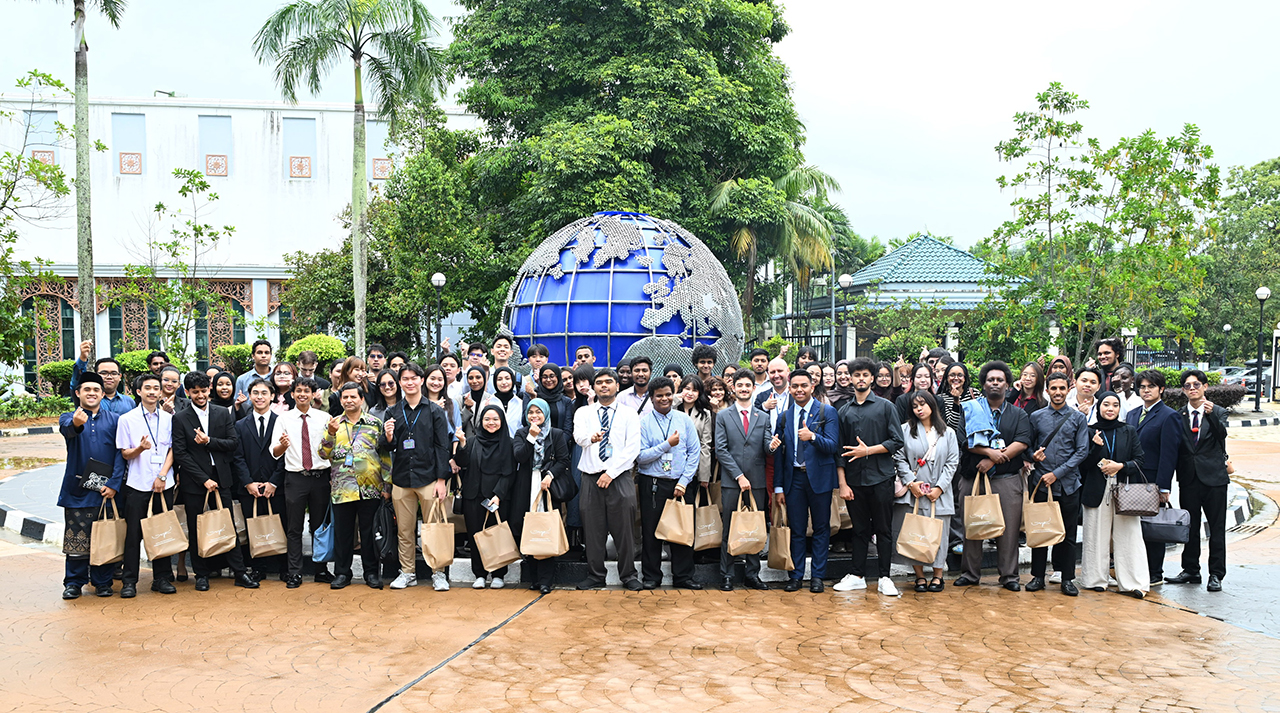APU’s International Relations Department sent 80 students to Malaysia’s Ministry of Foreign Affairs (Wisma Putra) for an insightful educational experience that included discussions about Malaysia’s foreign policy, strategic partnerships, and regional engagement, as well as a lively Q&A session on ASEAN cooperation, public diplomacy, dual citizenship, climate change, and Malaysian relations with Africa.

On 8th May 2025, 80 students from the International Relations Department at the Asia Pacific University of Technology & Innovation (APU) had the privilege of visiting the Ministry of Foreign Affairs of Malaysia, more commonly known as Wisma Putra.
The group was accompanied by Mr Muhammad Syahir Md Ali (Programme Manager), Ms Nurul Hidayah Badrul Ezan (Assistant Programme Manager), Dr Daniel Ruiz De Garibay Ponce, Mr Nuruddin Abdul Aziz, and Mr Mohamed Eliyas Hashim.
This enriching educational experience brought together students from diverse academic backgrounds and nationalities, offering them a unique opportunity to engage with the heart of Malaysia’s foreign policy decision-making process.
The visit started with the welcoming remarks from Ms Tina Rohayu Hamdan, Public Relations Officer at the Ministry of Foreign Affairs and the special lecture delivered by Mr Muhammad Nur Anuar, Assistant Secretary of the Communication & Public Diplomacy Division.
Mr Anuar provided a comprehensive overview of Malaysia’s foreign policy framework, shedding light on the nation’s strategic bilateral and multilateral partnerships.
His speech shed light on Malaysia’s diplomatic goals, regional activities, and developing role on the world stage.
A particularly engaging segment of the session was a question and answer (Q & A), where Anuar invited students to pose questions on Malaysia’s foreign policy.
The discussion that followed was lively, with students showing keen interest in topics ranging from ASEAN cooperation to Malaysia’s contributions to global peacekeeping efforts.
One major lesson from Anuar’s presentation was his focus on public diplomacy and the importance of inclusive foreign policymaking.
He highlighted the Ministry’s ongoing efforts to raise public awareness and involve citizens in shaping Malaysia’s international engagements.
The students responded with enthusiasm, many expressing a strong desire for this visit to become an annual event for the International Relations Department.
Their feedback highlighted the immense value of experiential learning and direct interaction with policymakers.
Theory beyond the books
The educational visit to Wisma Putra bring rare opportunity to engage directly with policy practitioners.
Throughout the visit, students posed thought-provoking questions that highlighted their curiosity and understanding of Malaysia’s foreign policy.
Karim Esameldin, one of the students present, raised an intriguing question about the Ministry’s approach to managing social media in relation to international relations.
“In today’s digital age, social media plays a pivotal role in diplomacy and international relations.
“I was curious to understand how Wisma Putra navigates this landscape, especially when it comes to handling sensitive international issues,” he shared.
His question emphasised the growing importance of online platforms in shaping global perceptions and international dialogues.
Muhammad Izzul Hazreel raised concerns about the Malaysian government’s decision to resume direct train services between Bangkok and Malaysia.
His query focused specifically on the potential security implications of dual citizenship in the context of this development.
“I am particularly concerned about the implications of dual citizenship in terms of national security.
“With the introduction of direct train services, I wanted to understand how the government balances connectivity with security measures,” he explained.
His question touched on a crucial issue as Malaysia seeks to expand its regional transportation infrastructure while safeguarding national interests.
Thohira Azhaaru took the opportunity to inquire about Malaysia’s stance on climate change, a topic that has become increasingly important on the global stage.
“I wanted to know what efforts the Malaysian government is making to address climate change and whether there are any plans for future international collaboration in this area,” Thohira said.
She also expressed interest in understanding how students might be involved in these efforts, specifically asking about opportunities for international students to intern at Wisma Putra.
“Internships with the Ministry would offer invaluable experience in shaping policy decisions,” she added.
Njabulo Ngubane’s question reflected her interest in Malaysia’s international relations with the African continent.
She asked, “How does Malaysia engage with Africa, and are there any specific bilateral agreements with South Africa?”
Her query highlighted the significance of strengthening Malaysia’s ties with African nations and understanding the broader context of Malaysia’s diplomatic reach.
The department extends its heartfelt thanks to Wisma Putra for their warm hospitality, and to Mr Anuar for his insightful presentation.
Special thanks also go to the accompanying lecturers for their support in making this visit a memorable and impactful experience.
News & Happening
Download e-Brochures
Intake Calendar
Want to know more ?
Let’s Connect